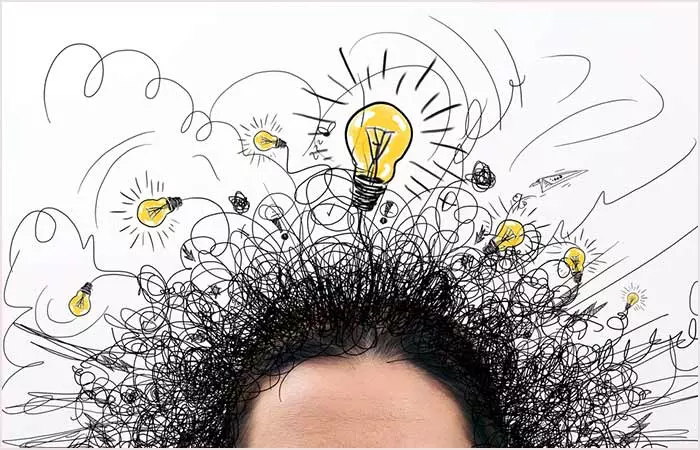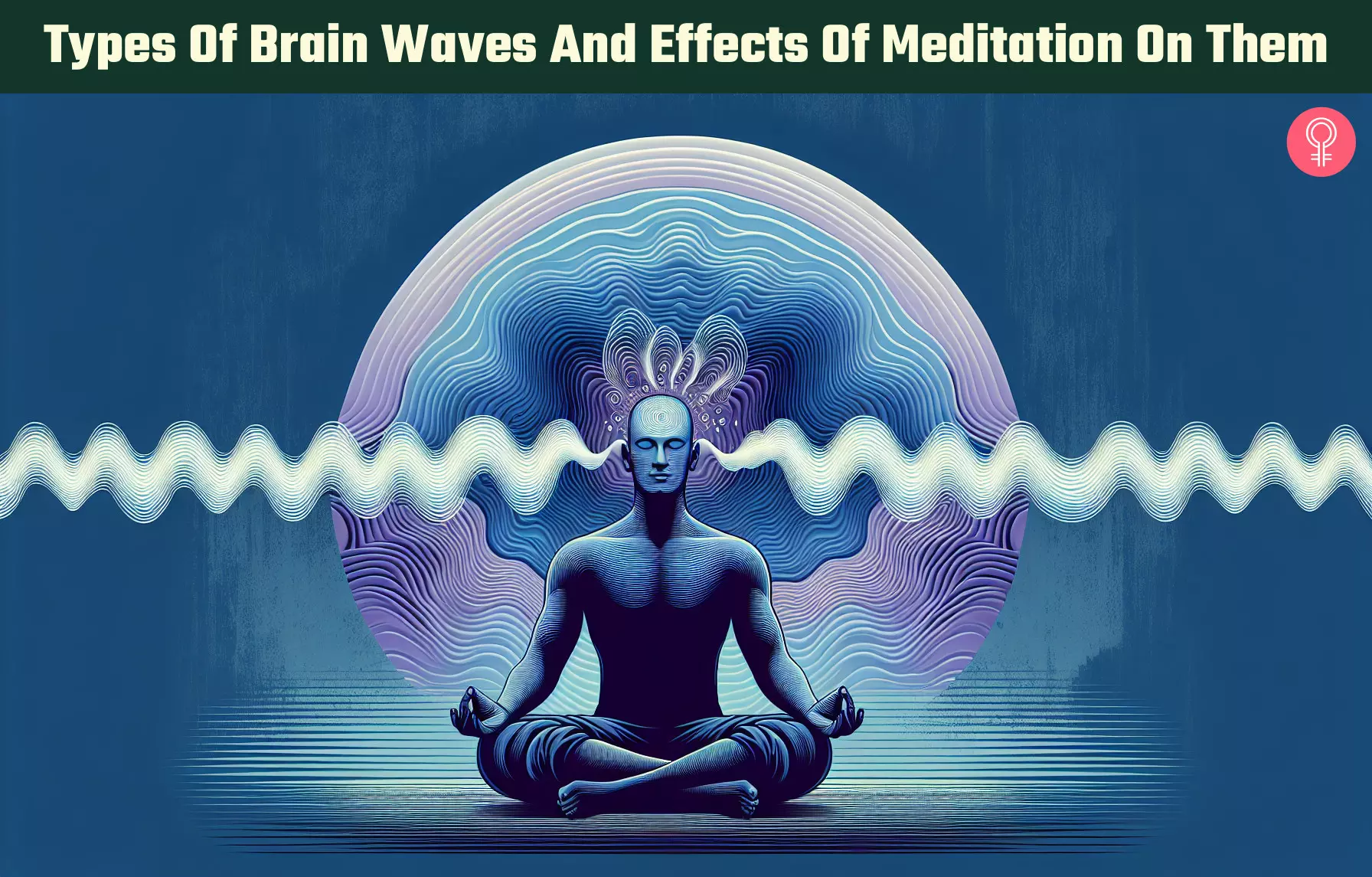5 Types Of Brain Waves And Effects Of Meditation On Them
Delve into the world of meditative peace to have your thoughts and stress under control.

Image: Shutterstock
Meditation is more than a spiritual practice. It has been proven that meditation brain waves, which are electromagnetic energyi Any type of energy that travels through space as waves at the speed of light, including those that are released into space by stars. , represent the impacts of meditation on your body. Yes, you read that correctly.
While you meditate, many changes occur in your brain, which you will understand and learn about here. The article explores the connection between meditation and brain waves. It will help you find out how meditating can help optimize your mental health and cognitive performance. Before we learn about the effects of meditation on brain waves, it is important to understand more about the latter. After all, they reflect our mental state and overall health. So, with further ado, let us explore brain waves followed by the effects of meditation on brain waves. Keep reading!
 Did You Know?
Did You Know?In This Article
What Are Brain Waves?
Brain waves are produced when neurons in your brain communicate with each other.
They are synchronized electrical pulses.
Different types of brain waves are produced when you have thoughts, emotions, and behavior. The brain waves differ according to your mood and activity.
Slower brain waves make you feel tired and slow, whereas brain waves of higher frequency make you alert and active.
Let’s find out what meditation does to the brain waves.
Key Takeaways
- Alpha waves are the brain waves that occur in the beginning of meditation as you try to get into a deep state of mind.
- Beta waves become active when the brain is working on goal-oriented tasks and create awareness.
- The gamma wave is associated with intense focus and decreases anxiety and fear by promoting positive emotions.
- The theta wave is linked to the third eye, provides a positive mental state, and encourages creativity.
- The delta wave is linked to the deepest stages of sleep and facilitates quick healing.

Effects Of Meditation On Brain Waves
There are five types of brain waves, and each stands for a particular activity. Brain waves fluctuate according to what you do and feel.
Deep meditation, when done correctly, may help move the brain waves from a higher frequency to a lower frequency, thereby having the ability to change how you feel.
There is a process known as brain synchronization where the brain waves in both hemispheres of the brain synchronize together with the outside stimuli. This state can be attained through meditation and may result in positive mood enhancement and improved creativity, mental clarity, and overall brain health.
Different parts of the brain get stimulated in a particular manner during meditation:
- The frontal lobe, which plans and reasons switch off during meditation, helps you detach and relax.
- The thalamus, which relays motor and sensory signals to the cerebral cortexi The outer layer or sheet of the neural tissue of the largest area of the brain, responsible for reasoning, language, and memory. , slows down its activity, enabling you to keep calm.
- The parietal lobe, which gives you a sense of time also slows down, helping to lower your stress and anxiety levels.
- The reticular keeps your brain alert and helps you respond to situations. During meditation, the reticular activity slows down, allowing you to keep calm and be peaceful.
To get a clear understanding, let’s learn about the different kinds of brain waves.
Types Of Brain Waves
1. Alpha Waves
Alpha waves are the most common brain waves that occur at the beginning of meditation as you try to go into a deeper state of mind.
They are electromagnetic oscillations with a frequency range of 8-12 Hz. Studies suggest that practicing transcendental meditation and kundalini yoga meditation have been associated with an increase in alpha waves (1), ( 2).
These waves were first discovered by Hans Berger using an electroencephalogram (EEG). He observed that alpha waves became prominent when people closed their eyes. However, they disappeared when people opened their eyes, shifting to faster beta and gamma waves. This happens because alpha waves represent the brain’s idle mode, similar to a car engine running but not accelerating. Over time, research has shown that alpha waves are a key part of how the brain transitions between states of rest and awareness (3).
Function: Alpha waves calm the nervous system. They lower blood pressure and heart rate. The waves lower the production of stress hormones and promote relaxation.
According to a study on college students, meditation may have a positive impact on stress levels. The experiment showed that it results in an overall decrease in alpha wave frequency. Thus, it can be more effective in increasing stress tolerance. Check out the graph below to see its impact.

Comparison Of Alpha Wave Frequency During Normal And Meditation State
Source: The Effects of Meditation and Music on Stress in College Individuals Quick Tip
Quick Tip2. Beta Waves
Beta waves occur with a frequency range of 12-30 Hz. They become active when the brain is working on goal-oriented tasks, such as planning an event or pondering over an issue.
Like alpha waves, beta waves were also first identified by Hans Berger, who associated them to focused attention. In 1929, he suggested that beta waves, rather than alpha waves, were responsible for mental activity. Initially, any brainwave above 13 Hz was classified as beta, but later studies divided them into two categories, low beta (13–21 Hz) and high beta (21–30 Hz), based on the difference in how they react to tasks.
Then, in 1949, scientists Giuseppe Moruzzi and Horace Magoun discovered that stimulating a specific part of the brainstem could shift brain activity from alpha waves to beta waves. Later, research showed that stimulating certain brain structures could produce the same effect, suppressing alpha waves and increasing beta activity (4)
Function: Beta waves create awareness and improve concentration. They increase logical thinking and develop your conversational abilities.
3. Theta Waves
Theta waves are often associated with the ‘third eye’ as they help us tap into our wisdom, according to spiritual teachings.
These become predominant when we do any task that is automatic like driving, washing clothes, shampooing hair, folding clothes, etc. They are also present in daydreaming and paranormal phenomenai Things, events, or perceptions that happen beyond the range of scientific explanation and thus considered beyond normal experiences. . It is said that achieving the theta state of mind is possible with guided meditation. For instance, the Silva meditation technique is said to evoke theta waveforms. You may also explore other benefits of the Silva method of meditation to understand how it works.
Japanese scientists Ishihara and Yoshii were the first to observe theta activity in the brain when participants in a study performed continuous arithmetic addition tasks. These waves occurred at around 6–7 Hz and were strongest in the frontal midline region. Thus, they were named the frontal midline theta rhythm. Theta waves are closely linked to the hippocampus, a brain area crucial for memory processing. Some scientists also believe that theta rhythms play a key role in encoding and retrieving memories. However, direct recordings of these in humans are rare and usually occur only in epilepsy patients undergoing special diagnostic procedures (5)
Function: Theta waves provide a positive mental state and encourage creativity. They improve cognitive functions like problem-solving and memory. These waves improve your focus and keep you calm and balanced.
4. Gamma Waves
Gamma waves are associated with intense focus. Long-term Vipassana meditation may lead to an increase in gamma power (6)
The study of higher-frequency gamma waves (30-60 Hz) gained attention by the 1980s. Research suggests that these waves are the fastest type of brain activity. They play a big role in thinking, learning, memory, and processing information. When these waves are too strong, they may cause anxiety and stress. However, if they are too weak, they may lead to issues like ADHD, depression, and trouble learning (7).
Function: Gamma waves decrease anxiety and fear and increase positive emotions. They reduce depressive feelings and symptoms.
5. Delta Waves
Delta waves are high amplitude brain waves with a frequency of 0-4 Hz. These brainwaves are associated with the deepest stages of sleep.
They were first mentioned by an American-British neurophysiologist, William Grey Walter, in the 1930s. Research suggests that these are the slowest meditation brain waves and are most common in babies and young children. They are linked to deep, healing sleep and complete relaxation. High levels of delta waves are often seen in people with brain injuries and learning difficulties. If these waves are too weak, they may lead to poor sleep, making it harder for the body and brain to recover (8).
Function: Delta waves increase the production of two anti-aging hormones, DHEA and melatonin. They help promote deep compassion and empathy for others, improve social intelligence, and avoid conflict. The waves facilitate quick healing.
During meditation, the brain shows theta waves predominantly. These waves are associated with a relaxed state of mind as compared to alpha waves, which are associated with an aroused state of mind.
Benefits Of Meditation On The Brain
Steph Ball-Mitchell, a certified yoga instructor, says, “While meditation may not be able to treat all brain disorders or injuries, there is evidence to suggest that it may be a valuable tool for promoting brain health and healing. By reducing stress, increasing gray matter, improving cognitive function, promoting neuroplasticity, and reducing inflammation, meditation may be able to help the brain recover from injury or disease and promote overall health and wellbeing.” Let’s look at a few benefits listed below:
1. Gray Matter

Although there is no conclusive scientific proof of this, some studies have shown that meditation is linked to the larger amounts of gray matter in the frontal areas of the brain. More gray matter can increase focus and emotional stability in an individual.
An MRI study conducted at Harvard University showed that meditation leads to thicker gray matter in the parts of the brain that are associated with compassion and self-awareness (9).
2. Anxiety

Numerous neural pathways emerge from the medial prefrontal cortexi The section of the brain that lies at the front, crucial for skills like planning, memorizing, and developing personality traits. of our brain. These trails connect to the brain’s fear and bodily sensation perception centers. When you are in an upsetting situation and feel scared or anxious, the prefrontal cortex is stimulated.
Meditation essentially loosens these tight connections to ensure no strong reaction is triggered in the prefrontal cortex. Meditation reduces the pangs of anxiety (10).
3. Resilience

Some researchers at Wisconsin-Madison University took MRI images of Tibetan monks and discovered that meditation, mental resilience, and neuroplasty enhancity may have a deep-rooted connection. The study shows that meditation helps the amygdala (which is associated with emotion and emotional memories) recover quickly from trauma or stress (11).
4. Stress

Stress reduction is one of the biggest benefits of deep meditation.
5. Creativity

At Leiden University, Netherlands, researchers found that people who practiced open-monitoring meditation performed better at tasks that demanded divergent thinking (12).
6. Memory

According to research conducted by the Osher Research Center and Martinos Center for Biomedical Imaging, people practicing mindful meditation could adjust their brain waves to tune out distractions (13). This may result in improved memory, increased productivity, and easy incorporation of new information.
7. Immunity
The immense benefits of meditation are not limited to mental well-being. According to a study, when you meditate, your brain undergoes certain changes and activates centers related to emotions and cognitive functions (14). This helps boost the immune system by reducing stress and promoting positive emotions.
The calming process of meditation positively also affects your mental and physical well-being. Regular meditation helps reduce the levels of a substance called interleukin six (IL-6), a biomarker of stress (14), (15).
Additionally, meditation may influence genes by regulating telomerase, an enzyme that could potentially delay aging, increase cell longevity, and may have anti-cancer benefits, though there is not enough scientific evidence for the same. So, meditation may calm the mind, lower stress hormone levels, and promote relaxation, ultimately enhancing the body’s resilience against illnesses.
So, mindfulness practice can influence brain activity and create a state of relaxation response by reducing stress and anxiety. Another important benefit of mindfulness practice is it enhances emotional regulation by increasing attentional focus. The following section will introduce you to a routine you can follow for it.
Step-By-Step Routine For Meditation Brain Waves
Select a peaceful and comfortable place free from distractions to start your meditation routine. Once there, follow these steps:
- Sit cross-legged on the floor with your spine kept straight. You can also lie down if preferred.
- Close your eyes and begin with deep breathing exercises to activate alpha waves.
- You can follow the diaphragmatic breathing method, where you inhale for four counts through your nose, hold for four, and exhale through your mouth for four.
- Do this for a few minutes while focusing on your breath.
- If your mind wanders, bring your attention back to your breath.
- Stay consistent with your routine to go into a deeper state of meditation and activate beta, theta, gamma, and delta waves.
- You can also engage in guided meditation or visualization exercises that are available on platforms like YouTube.
If you feel one of your meditation brain waves is dominant, try to figure it out to make the most of it. Focus on your mental state, qualities, and focus levels. For instance, if you have intense concentration, your gamma wave might be dominant. Similarly, if you are empathetic and have high social intelligence, your delta waves might be dominant. You may also try brainwave monitoring devices like EEG headbands.
Infographic: Types And Benefits Of Brain Wave Meditations
Now that you know the types of brain waves, we’d like to stress on their benefits. Afterall, only if you understand their benefits better will you be able to completely appreciate this type of meditation.
Check out the infographic below to know the remarkable effects of meditation on different brain waves.
Some thing wrong with infographic shortcode. please verify shortcode syntax
Your mood depends on the frequency of your brain waves, which can be controlled when you master the art of meditation. It helps stimulate different parts of the brain, helping you calm your mind and reduce anxiety and stress levels. The effects of meditation on brain waves include enhancing spiritual growth, mind-body connection, peak performance, lowering blood pressure and heart rate, calming the nervous system, improving concentration and logical thinking, enhancing memory, reducing anxiety, and producing anti-aging hormones like melatonin and DHEA. So, say ‘yes’ to meditation and transform yourself from within!
Frequently Asked Questions
What meditation techniques are most effective for brain wave modulation?
Meditation techniques that are the most effective for brain wave modulation include mindfulness meditation and focused attention meditation. These increase alpha and theta waves, promoting relaxation and creativity (16), (17). Similarly, transcendental meditation may also help increase theta and alpha activity and decrease anxiety and stress (18).
Does meditation permanently change the brain?
Ball-Mitchell says, “There is evidence to suggest that meditation can have long-lasting effects on the brain and may even lead to permanent changes in brain structure and function. Studies have shown that long-term meditation practice can increase gray matter in several regions of the brain, including areas involved in attention, memory, and emotional regulation.”
She adds, “Meditation has also been shown to promote neuroplasticity, which refers to the brain’s ability to adapt and change in response to experiences and learning. In addition, meditation has been shown to reduce activity in the default mode network. By reducing activity in this network, meditation may help promote a more present-focused, mindful state of awareness.”
She continues, “While the exact nature and extent of these changes are still being studied, there is evidence to suggest that meditation can have long-lasting effects on the brain and may lead to permanent changes in brain structure and function.”
Can meditation change your personality?
According to Ball-Mitchell, “There is some evidence to suggest that meditation can have positive effects on personality, but the extent and nature of these changes may vary depending on individual factors, such as the type and duration of meditation practice, as well as the personality traits being targeted.”
She adds, “One of the most commonly reported changes in personality associated with meditation is increased openness. Meditation has also been shown to have positive effects on other aspects of personality, such as emotional stability and conscientiousness.”
Does meditation reset the brain?
According to Ball-Mitchell, “In some sense, meditation may be able to “reset” the brain by promoting a more present-focused, mindful state of awareness. By directing attention away from distractions and worries and toward the present moment, meditation may be able to help individuals “reset” their mental state and approach situations with a greater sense of clarity and calmness.”
How often do I practice meditation?
Practice meditation every day for at least 20 minutes.
Can I see a difference in my brain scan before and after meditation?
Yes, you can. Meditation can alter the mechanism of your brain after some time.
Yes, you can. Meditation can alter the mechanism of your brain after some time. The human body makes for a fascinating body of study. The brain that controls it is even more so. All this while, we viewed meditation as an immeasurable quantity which it is. However, many recent studies could figure out a coherent manner to display its effects. And, the scientific benefits of meditation still need to be researched further to know its full capability.
Can too many alpha brain waves cause problems?
Yes. It may even lead to drowsiness, loss of focus, and attention problems, and reduce general awareness.
Illustration: Types Of Brain Waves And Effects Of Meditation On Them

Image: Dall·E/StyleCraze Design Team
Meditation has been proven to have a positive impact on the brain and its functioning. This video explores how meditation can help improve mental clarity and focus. Gice it a listen today!
References
Articles on StyleCraze are backed by verified information from peer-reviewed and academic research papers, reputed organizations, research institutions, and medical associations to ensure accuracy and relevance. Read our editorial policy to learn more.
- Review of the Neural Oscillations Underlying Meditation
https://www.ncbi.nlm.nih.gov/pmc/articles/PMC5890111/ - Efficacy of yoga for mental performance in university students
https://www.ncbi.nlm.nih.gov/pmc/articles/PMC3890927/ - Alpha Wave
https://www.sciencedirect.com/topics/neuroscience/alpha-wave# - Beta Wave
https://www.sciencedirect.com/topics/biochemistry-genetics-and-molecular-biology/beta-wave# - Theta Rhythm
https://www.sciencedirect.com/topics/medicine-and-dentistry/theta-rhythm - Occipital gamma activation during Vipassana meditation
https://www.ncbi.nlm.nih.gov/pmc/articles/PMC2812711/ - Gamma Wave
https://www.sciencedirect.com/topics/biochemistry-genetics-and-molecular-biology/gamma-wave - Delta Wave
https://www.sciencedirect.com/topics/neuroscience/delta-wave - Eight weeks to a better brain
https://news.harvard.edu/gazette/story/2011/01/eight-weeks-to-a-better-brain/ - Effects of Mindfulness-Based Stress Reduction on employees’ mental health: A systematic review
https://journals.plos.org/plosone/article?id=10.1371/journal.pone.0191332 - Buddha’s Brain: Neuroplasticity and Meditation
https://www.ncbi.nlm.nih.gov/pmc/articles/PMC2944261/ - Meditate to Create: The Impact of Focused-Attention and Open-Monitoring Training on Convergent and Divergent Thinking
https://www.ncbi.nlm.nih.gov/pmc/articles/PMC3328799/ - Effects of mindfulness meditation training on anticipatory alpha modulation in primary somatosensory cortex
https://pubmed.ncbi.nlm.nih.gov/21501665/ - Meditation and its mental and physical health benefits in 2025
https://www.ncbi.nlm.nih.gov/pmc/articles/PMC10355843/ - Il-6 induced by social stress promotes a unique transcriptional signature in the monocytes that facilitate anxiety
https://www.ncbi.nlm.nih.gov/pmc/articles/PMC6440848/ - The effect of a mindfulness-based education program on brain waves and the autonomic nervous system in university students
https://www.ncbi.nlm.nih.gov/pmc/articles/PMC8625257/ - Focused attention meditation training modifies neural activity and attention: longitudinal EEG data in non-meditators
https://www.ncbi.nlm.nih.gov/pmc/articles/PMC7304517/ - The biological dimensions of transcendent states: A randomized controlled trial
https://www.ncbi.nlm.nih.gov/pmc/articles/PMC9498345/
Read full bio of Dr Perpetua Neo
- Steph Ball-Mitchell, E-RYT-500, RPYT, RCYT, is a yoga trainer with over 25 years of experience. As the owner and founder of both Online Yoga School and Yoga & Ayurveda Center, she has trained and certified thousands of teachers internationally over the past decade.
 Steph Ball-Mitchell, E-RYT-500, RPYT, RCYT, is a yoga trainer with over 25 years of experience. As the owner and founder of both Online Yoga School and Yoga & Ayurveda Center, she has trained and certified thousands of teachers internationally over the past decade.
Steph Ball-Mitchell, E-RYT-500, RPYT, RCYT, is a yoga trainer with over 25 years of experience. As the owner and founder of both Online Yoga School and Yoga & Ayurveda Center, she has trained and certified thousands of teachers internationally over the past decade.
Read full bio of Shirin Mehdi
Read full bio of Ravi Teja Tadimalla
Read full bio of Himanshi Mahajan




























Community Experiences
Join the conversation and become a part of our empowering community! Share your stories, experiences, and insights to connect with other beauty, lifestyle, and health enthusiasts.